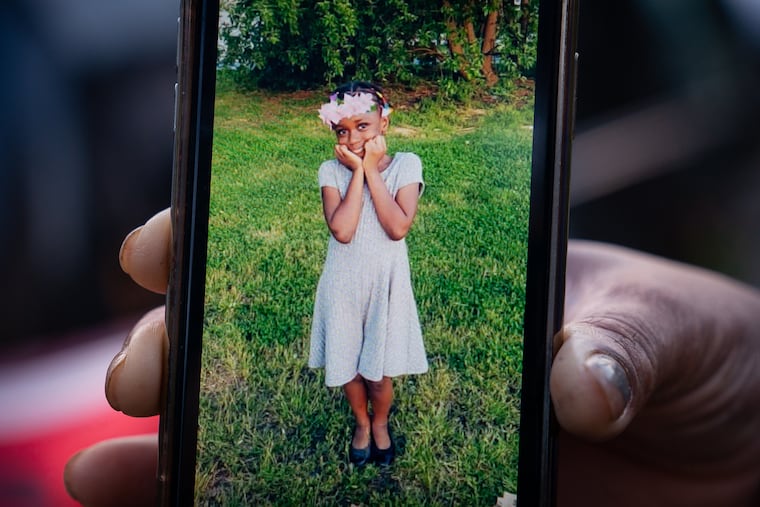Differing treatment of police and Delco teens shows culture of racial discrimination | Opinion
After the death of 8-year-old Fanta Bility, the Delco DA is charging two teenagers with first-degree murder, while the cops who actually killed the child are out on paid leave.

Delaware County District Attorney Jack Stollsteimer announced that he plans to charge two Black teenagers with first-degree murder for the killing of 8-year-old Fanta Bility, even though police shot her. Fanta was leaving a football game with her family in late August when she was killed.
According to Stollsteimer’s own statement, neither of the boys is alleged to have shot Fanta; both were down the block from her at the time she was shot. The DA has stated that, with “near certainty,” officers shot Fanta. They fired 21 shots that struck four people, ultimately taking the life of Fanta — a daughter, sister, schoolmate, and friend.
But Stollsteimer has not charged police officers with anything in Fanta’s death. Instead, he has leveled first-degree murder charges at the two teenagers who are alleged to have shot at each other down the street from where Fanta was killed, charges potentially carrying a life without parole sentence. This decision is a textbook illustration of how racial discrimination functions in the criminal punishment system: as a means to punish the powerless and protect the powerful.
How could Stollsteimer charge two teenagers with first-degree murder, and plan to transfer them to an adult jail without bail, while the cops who actually killed Fanta are out on paid leave? And what does their arrest mean for the grand jury that Stollsteimer plans to convene on Nov. 18, when jury members will decide whether to indict any of the officers in Fanta’s murder?
Answering these questions requires an explanation of what a grand jury is, and why prosecutors use them when police kill, but not when charging Black and brown people.
In cases involving police, who prosecutors work with every day, grand juries are often used to put on a show behind closed doors, ultimately absolving the police of any wrongdoing. No defense attorney is present. The district attorney interprets the law without opposing counsel there to counteract their statements, and the general public may never be made aware of the witnesses’ testimony. Convening a grand jury is part of the playbook for excusing police violence — indeed, we’ve seen it when prosecutors attempted to indict police officers in the murders of Mike Brown, Tamir Rice, Eric Garner, and Breonna Taylor.
Stollsteimer is not required to call a grand jury for the police. Doing so is a choice he made, and it allows the police the benefit of having community members decide whether they should be arrested and go through the legal process.
He could have made the same choice for the two teens in this case, showing them the same amount of carefulness he uses to indict police. Not doing so was also a choice.
By charging these two Black teens, Stollsteimer is likely seeking a scapegoat so he can stretch the legal theory of transferred intent to its breaking point.
In order to secure a first-degree murder conviction, the prosecution must employ the legal theory of “transferred intent”: the idea that when these two young men fired their guns, any intent to kill each other was “transferred” to the actual murder victim, Fanta.
To put it simply, the transferred intent doctrine normally applies in a criminal case when person A attempts to kill person B but accidentally kills person C. It does not apply in a case where person A (allegedly) attempts to kill person B, and then person C (who just happens to be a police officer) kills person D by discharging their weapon without knowing who they were shooting at or why.
The prosecution will have to argue that the police killing of Fanta was a foreseeable and reasonable consequence that can be blamed on the actions of the two young boys.
Has Stollsteimer explained to the family of Fanta Bility what his charging decision means? That the two teens charged with murder can only be held liable if the police reaction — wildly firing into an uninvolved vehicle — was foreseeable and reasonable?
This is why we know the grand jury is unlikely to find these officers accountable. The DA is presenting evidence to this grand jury, and any finding that the police are to blame would undermine the charges against the teen boys. Stollsteimer’s scapegoat prosecution requires a legal conclusion that the police officers’ response was reasonable and therefore legally justified.
In making this charging decision, the DA is telling the community that it is reasonable for their police officers to shoot blindly into a crowd of Black children and families when there is a vague threat in the area.
Stollsteimer’s decision to charge the teenagers with Fanta’s murder, and the likely non-prosecution of the cops, shows a contempt for Black life that should disqualify those responsible from holding public office. We owe it to Fanta and all victims of state violence to speak out against this travesty and call for real accountability.
Bret Grote is the legal director at the Abolitionist Law Center. Rupalee Rashatwar and Nia Holston are staff attorneys at the Abolitionist Law Center.